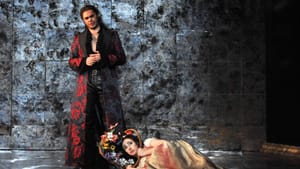Stay in the Loop
BSR publishes on a weekly schedule, with an email newsletter every Wednesday and Thursday morning. There’s no paywall, and subscribing is always free.
The Wilt Chamberlain of the 18th century
Opera Philadelphia's 'Don Giovanni'

Don Giovanni is titled a dramma giocoso, a jocular drama. Most recent productions stress the drama, but Nicholas Muni emphasizes the jocularity. Some of the actions of the licentious Don are so outlandish that you have to laugh at them.
The legendary rake Don Juan leaves a trail of discarded lovers and mayhem in his wake, and he laughs at the havoc he causes. I’ve always thought of him being past his prime at the time of the action because he appears unsuccessful in some of his pursuits. But the director sees the Don as in his mid-20s. The "Catalogue" aria says he’s had over 2,000 conquests. If he started in his mid-teens, that would come to 200 a year — and that does not seem unrealistic. Basketball star Wilt Chamberlain, after all, wrote that he had sex with 20,000 women, staying active into his 60s. "That equals out to having sex with 1.2 women a day since I was 15 years old," he bragged.
To illustrate this thesis, Muni portrays sexual encounters at places in the opera where none were specifically written. While Leporello and Giovanni are singing a duet on the street, for example, this production shows the Don having his way with a woman while he continues to talk with his servant.
Outrageous, you may say. But Don Giovanni is an outrageous person. He’s a sociopath who is indiscriminate in the women he seduces — who include an older woman with a cane — and doesn’t pay attention to their feelings or desires, only his own. That’s the opera’s point.
The production doesn’t meddle with the place or time, and it keeps the action flowing rapidly from indoor to outdoor locales. A plethora of picture frames serve a double purpose: They contain Goyaesque images from Spain in the second half of the 18th century and also symbolize Don Giovanni’s feeling that he’s penned in, restricted by society’s framework and moral codes.
Some of the choices Muni made add humor and aid our understanding of people’s choices. Donna Elvira, for instance, is shown getting soused, which helps explain why she allows herself to get involved once again with the duplicitous Don.
Even though Elliot Madore was youngish for the title role, he won me over with fine acting and good singing. His voice is smooth and attractive, and his nuances were more than I had expected from a performer at his stage of development. Joseph Barron's Leporello was believable and appealing, and David Portillo provided excellent vocalizing in Don Ottavio’s two arias.
As for the women, Michelle Johnson as Donna Anna displayed creamy high notes but a tame characterization. Amanda Majeski as Donna Elvira had fine technique and glittering tone. Her vibrato made her sound a bit high-strung and jittery, which suits her character. Cecelia Hall was a direct, no-nonsense Zerlina, the peasant girl who fools around with Don Giovanni on the very day of her wedding to Masetto (the sturdy Wes Mason), whom she says she loves. At least the Don “didn’t touch me where it counts,” or so she says.
George Manahan’s conducting was not all that it could have been. Pacing was often slow, and there was insufficient excitement.
What, When, Where
Don Giovanni. By Wolfgang Amadeus Mozart and Lorenzo Da Ponte. George Manahan conducted, Nicholas Muni directed. OperaPhilly production. April 24-May 4, 2014 at the Academy of Music, Broad & Locust Sts., Philadelphia. 215-893-1018 or www.operaphila.org.
Sign up for our newsletter
All of the week's new articles, all in one place. Sign up for the free weekly BSR newsletters, and don't miss a conversation.

 Steve Cohen
Steve Cohen